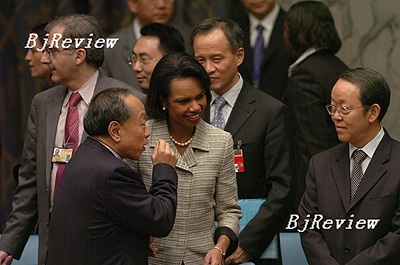
Since early 2003, the Darfur issue has been the cynosure of the world's eye, thanks to special attention devoted to it by the Western media, human rights' organizations and politicians. Since China and Sudan have had a long tradition of friendship and close political and economic ties, the Darfur issue has also become an excuse for some organizations to attack China, thus fueling media frenzy even more. What, then, are the real issues behind this problem, and what is China's role in resolving it?
From ecological war to a political and diplomatic war
Located in west Sudan (which is bordered by Libya, Chad and the Central African Republic), Darfur covers an area of 500,000 square km, about one fifth of the total area of Sudan. There are about 80 tribes in this region, the least-developed area of Sudan, and the two biggest tribe groups are Arabian and African. The former is a nomadic tribe distributed over the north of the area, and the latter an agricultural tribe inhabiting the central and southern parts. Apart from occasional conflicts over land and water, the two tribes have more or less always coexisted peacefully.
In the 1970s, drought drove Arabian tribes from northern Darfur and from neighboring countries like Chad and Mauritania, to central and southern Darfur, leading to an increase in population from 3 million people 20 years ago to its current 6 million people. This factor, combined with famine, began to prove disastrous for the fragile ecosystem, and frequent land and water disputes erupted. The bigger tribes, those in the north, were mostly Islamic, and they went into war against the Christian blacks of the central and south regions. They even established militia groups in a bid to win the war. Moreover, the Khartoum Government, mainly in the hands of the Arabians, inevitably took measures in favor of their own ilk. As a result, an ecological conflict gradually turned into a political and religious war.
In 2004, the Darfur issue formally upgraded from a domestic conflict to a "world focus" conflict. There were several reasons behind the upgrade. First, the deterioration of the regional situation: since February 2003, two military forces, the Sudan Liberation Movement and the Justice and Equality Movement, began antigovernment action in the name of protecting themselves from Arabian militia attacks, which had killed over 10,000 people, and left about 1 million homeless. Second, in 2004, international societies held photographic exhibitions and lectures to mark the 10th anniversary of the Rwanda Massacre, in a bid to prevent it from happening again. Finally, U.S. involvement made a big difference. In 2004's presidential election, Bush's tough and unilateral diplomatic strategy had been attacked by the Democrats. To get more votes from Africans and Christians and beat down Clinton's administration, which did nothing during the Rwanda Massacre, the Bush administration used the Darfur issue as leverage. Although the UN had categorized the Darfur issue as a humanitarian crisis, the U.S. Parliament passed a resolution labeling the Darfur issue as "genocide," and demanded that the U.S. Government promptly impose sanctions on Sudan. This led to the internationalization of the Darfur issue. What's more, Sudan's strategic location, and its ample oil and natural gas resources meant a lot to the U.S.-led global war on terror post 9/11.
In recent decades, China and Sudan have been jointly developing oil exploration. It is natural, therefore, that some organizations should link China with Darfur, and say that China's investment in Sudan and its cooperation with the Sudan Government are worsening the regional conflict. Previously, over 100 U.S. representatives threatened the Chinese President in a letter, pointing out that if China did not take measures with regard to Darfur, the 2008 Olympic Games in Beijing might be jeopardized.
Constructive role
There are two major allegations leveled at China by the Western media and international organizations. One, that China objected to using sanctions on Sudan when the UN Security Council was discussing the Darfur issue; and two, that China has not pressurized the Sudanese Government enough to change its stance.
The Chinese Government has taken a stand on diplomacy already, that regional and international conflicts should be settled through diplomatic means such as dialogues and negotiations; this applies not only to the Darfur issue, but also to the North Korea and Iran issues. History tells us that sanctions can only deepen poverty, and poverty deepens conflicts. Those that are hit hardest by sanctions are the common people, not the authorities. Besides, isolating the Sudanese Government creates only new levels of confrontation. The root of the Darfur issue is poverty, and so economic development and cooperation are the solution. This is China's method of attacking the problem, based on dialogue, negotiation, development and cooperation.
Since the Darfur issue emerged, China has been in constant communication with the relevant people, playing mediator, promoting dialogue between top leaders, dispatching envoys, discussing the problem in the UN assembly. President Hu Jintao held discussions with Sudanese President Omar Al-Bashir on the Darfur issue during the Beijing Summit of the Forum on China-Africa Cooperation last November and his visit to Sudan early this February. He made four principle points on the issue.
Sudan's sovereignty and territorial integrity should be respected, and the settlement of the issue should be helpful for Sudan's reconciliation process, its national unity and regional peace and stability.
The issue should be resolved by peaceful means and by sticking to dialogue and cooperation based on equality.
The African Union and the United Nations should play constructive roles in peacekeeping missions to Darfur. Wisdom and creativity should be employed in order to improve the efficiency of the peacekeeping mission to create favorable conditions for achieving peace in the region.
Finally, it is imperative to improve the situation in Darfur and the living conditions of its locals. For this purpose, China has offered assistance totally valued at 80 million yuan to the Darfur region, and donated $1.8 million to the peacekeeping organizations of the African Union.
|
